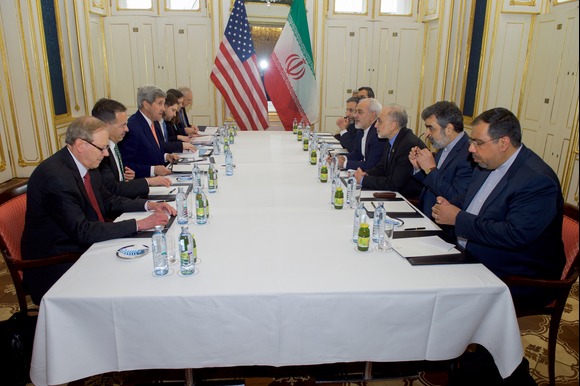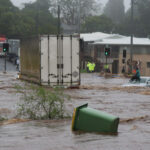JERUSALEM —
US President Donald Trump announced on Wednesday that the United States would begin nuclear negotiations with Iran next week, raising the prospect of a possible agreement shortly after declaring that American military strikes had severely damaged Iran’s nuclear infrastructure.
Trump claimed the US-led attacks had resulted in the “total obliteration” of Iran’s nuclear capabilities, saying they had set the Islamic republic’s programme back “decades”. However, a leaked US intelligence report contradicted this assertion, suggesting the strikes had likely delayed Iran’s nuclear ambitions by only a few months.
The announcement came just a day after a ceasefire was brokered between Israel and Iran, ending a 12-day war in which both nations exchanged their heaviest firepower to date. During the conflict, Israel conducted sustained bombing campaigns targeting Iranian nuclear and military sites, while Iran launched repeated missile barrages on Israeli territory.
The US intervened in support of Israel over the weekend, striking two Iranian nuclear facilities with bunker-buster bombs and launching a guided missile from a submarine at a third site.
“They’re not going to be building bombs for a long time,” Trump said during a public appearance. He added that the ceasefire, which he had personally declared on Tuesday, was “going very well.”
Trump also mentioned a recent meeting with Pakistan’s army chief, Field Marshal Asim Munir, referring to him as “a very impressive general,” and adding that the meeting took place in his office last week.
Speaking to reporters later, Trump said both Israel and Iran were “tired, exhausted,” and revealed that talks with Iran were scheduled for the following week. “We may sign an agreement. I don’t know,” he said, teasing the possibility of renewed diplomacy.
Iranian President Masoud Pezeshkian, speaking on Tuesday, expressed willingness to return to nuclear negotiations, while insisting on Iran’s right to peaceful use of nuclear energy.
Despite Trump’s claims of long-term damage to Iran’s nuclear capacity, Israel’s military remained cautious in its assessment. “It’s still early to determine the full scale of the damage,” said Israeli military spokesperson Effie Defrin. “I believe we have delivered a significant hit to the nuclear programme, and I can also say that we have delayed it by several years.”
Iran’s Foreign Ministry spokesperson, Esmaeil Baqaei, acknowledged to Al Jazeera that the country’s nuclear facilities had been “badly damaged, that’s for sure.” However, US media outlets cited sources familiar with a Defense Intelligence Agency assessment stating that the strikes had not destroyed Iran’s underground facilities or eliminated its centrifuges and enriched uranium reserves. Instead, some entrances were sealed, limiting access but leaving core infrastructure intact.
Israel maintained that its strikes, which began on June 13, were aimed at preventing Iran from obtaining nuclear weapons — a goal Iran has repeatedly denied pursuing. On Wednesday, Israeli army chief Eyal Zamir confirmed for the first time that Israeli commandos had operated inside Iran during the conflict.
“The forces operated in secret deep within enemy territory and created operational freedom of action for us,” Zamir said during a televised address.
Prime Minister Benjamin Netanyahu echoed Trump’s claims, stating in a national address after the ceasefire, “We have thwarted Iran’s nuclear project.” He warned, “If anyone in Iran tries to rebuild it, we will act with the same determination, with the same intensity, to foil any attempt.”
Meanwhile, the Iranian parliament voted on Wednesday to suspend cooperation with the United Nations’ nuclear watchdog, the International Atomic Energy Agency (IAEA), citing the agency’s failure to condemn the strikes on Iran’s nuclear sites. “The IAEA put its international credibility up for auction,” said parliament speaker Mohammad Bagher Ghalibaf, according to state TV. The move still requires the approval of the Guardian Council to take effect.
In an interview with Al Araby Al Jadeed, Foreign Minister Abbas Araghchi reaffirmed Iran’s commitment to the Non-Proliferation Treaty but criticised its inability to protect Iran’s nuclear facilities, saying that Tehran’s approach to the treaty “will undergo changes.”
Though Iran and Israel have engaged in covert hostilities for years, this recent 12-day war marked their most destructive direct confrontation. Israeli airstrikes targeted military bases, nuclear sites, and residential areas, killing Iranian scientists and top military officials. Iran retaliated with waves of missile strikes on Israel.
In Tehran, the atmosphere was subdued but slowly recovering. Some shops remained closed, but a few restaurants reopened and more people returned to the streets.
“Thank God, the situation has improved, the ceasefire has been reached, and people have returned to work and their lives,” said Saeed, a 39-year-old salesman.
Others expressed uncertainty. “I really don’t know… about the ceasefire but honestly, I don’t think things will return to normal,” said Amir, 28.
In Israel, the truce was welcomed by civilians eager for respite. “Finally, we can sleep peacefully. We feel better, less worried, for the kids, for the family. And I hope it stays that way,” said Yossi Bin, a 45-year-old engineer in Tel Aviv.
Iran’s health ministry reported at least 627 civilian deaths as a result of Israeli strikes during the conflict.






